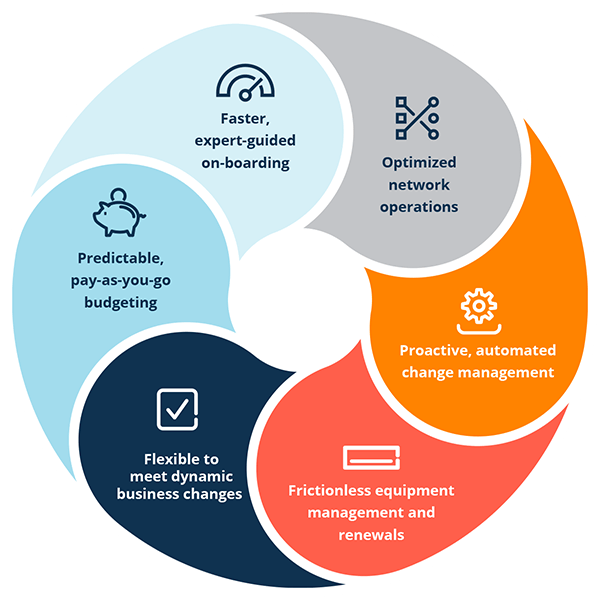Five Reasons Your Business Needs Network-as-a-Service

According to IDC research, businesses are prioritizing resiliency and agility as foundational elements of their IT strategy. They want more visibility, cross-platform control, better data management, and protection from the edge to the core. While consumption-based models are playing an increasingly important role in powering those goals to accelerate digital transformation, many business leaders are hesitant when it comes to Network-as-a-Service (NaaS). Some still think of as-a-service in terms of software, compute, and storage. However, as budgets grow tighter amid an inflationary economic environment, organizations need a better way to predict the ebbs and flows of the network, with flexibility to adapt as business needs change. That’s where NaaS comes into play.
Among the newest as-a-service approaches, NaaS combines hardware, software, services, and support in a pay-as-you-go model that delivers network services on a subscription basis. Allowing users to consume network infrastructure through flexible OpEx subscriptions, NaaS helps businesses shift their focus from managing their architecture to driving business outcomes.
If you haven’t transitioned to Network-as-a-Service yet, here are five reasons why you should:
- Cost savings: Network-as-a-Service allows you to acquire the network you need, when you need it, to avoid overprovisioning—in a pay-as-you-go OpEx model. Because you’re not locked into expensive infrastructure and rigid contracts, Naas allows you to more predictably manage costs and align budgets to business priorities. Additionally, with insights into all aspects of usage, including power, capacity, bandwidth speeds, and service levels, you can make more profitable financial decisions about workloads and upcoming projects.
- Security: As the prevalence of data breeches and ransomware continues to soar, enhancing network security is crucial. With proactive network monitoring, preventative maintenance, and real-time insights into network performance, the NaaS model offers enhanced network infrastructure protection with enterprise-grade security. With that, any nefarious activity can be immediately identified—and patches can be applied to address the breech before it becomes a problem.
- Performance and Productivity: Network-as-a-Service ensures your network operates efficiently by assessing traffic volume and making necessary adjustments. A better performing network means less downtime and greater staff productivity. Additionally, by outsourcing the full lifecycle of your enterprise network deployment, day-to-day operational management, upgrades, monitoring and troubleshooting activities to a NaaS partner, you free up your internal IT resources to focus on business-enabling tasks that add measurable value.
- Keep up with the pace of business: NaaS provides the financial flexibility to shorten planning cycle times and the agility to keep pace with changing conditions. By ensuring your network technology is refreshed as needed to support new workloads and changing requirements, a NaaS model makes it easy to scale your network as needs change.
- Environmental impact – NaaS offers a more sustainable way to consume network technology. With the ability to rent sustainable networks from a NaaS provider on a subscription basis, you don’t have to worry about where and how to dispose of old equipment. Plus, NaaS providers are committed to sustainable ‘reuse and retirement’ practices—and also well versed at configuring networks that are purpose-built to optimize energy consumption. By turning to a NaaS solution, you are making an environmentally sound decision that reduces your carbon footprint.
As market conditions continue to change at a rapid clip, your business needs to be one step ahead of your competition. With NaaS solutions from Aruba, Zunesis can help you move from reactive network management to a proactive approach that uses the network to deliver innovation and power profound business outcomes.
For more information about how you can accelerate business outcomes with Aruba’s subscription-based network consumption model, contact us here.
Categories
Search
Blog Categories
Related Resources
Archives
- July 2024
- June 2024
- May 2024
- April 2024
- March 2024
- January 2024
- October 2023
- September 2023
- August 2023
- July 2023
- June 2023
- May 2023
- April 2023
- March 2023
- February 2023
- January 2023
- October 2022
- July 2022
- June 2022
- May 2022
- April 2022
- March 2022
- February 2022
- January 2022
- December 2021
- November 2021
- October 2021
- September 2021
- August 2021
- July 2021
- June 2021
- May 2021
- April 2021
- March 2021
- February 2021
- January 2021
- December 2020
- November 2020
- October 2020
- September 2020
- August 2020
- July 2020
- June 2020
- May 2020
- April 2020
- March 2020
- February 2020
- January 2020
- December 2019
- November 2019
- October 2019
- September 2019
- August 2019
- July 2019
- June 2019
- May 2019
- April 2019
- March 2019
- February 2019
- January 2019
- December 2018
- November 2018
- October 2018
- September 2018
- August 2018
- July 2018
- June 2018
- May 2018
- April 2018
- March 2018
- February 2018
- January 2018
- December 2017
- November 2017
- October 2017
- September 2017
- August 2017
- July 2017
- June 2017
- May 2017
- April 2017
- March 2017
- February 2017
- January 2017
- December 2016
- November 2016
- October 2016
- September 2016
- August 2016
- July 2016
- June 2016
- May 2016
- March 2016
- February 2016
- January 2016
- December 2015
- October 2015
- September 2015
- August 2015
- July 2015
- June 2015
- May 2015
- April 2015
- March 2015
- February 2015
- January 2014
- February 2013




